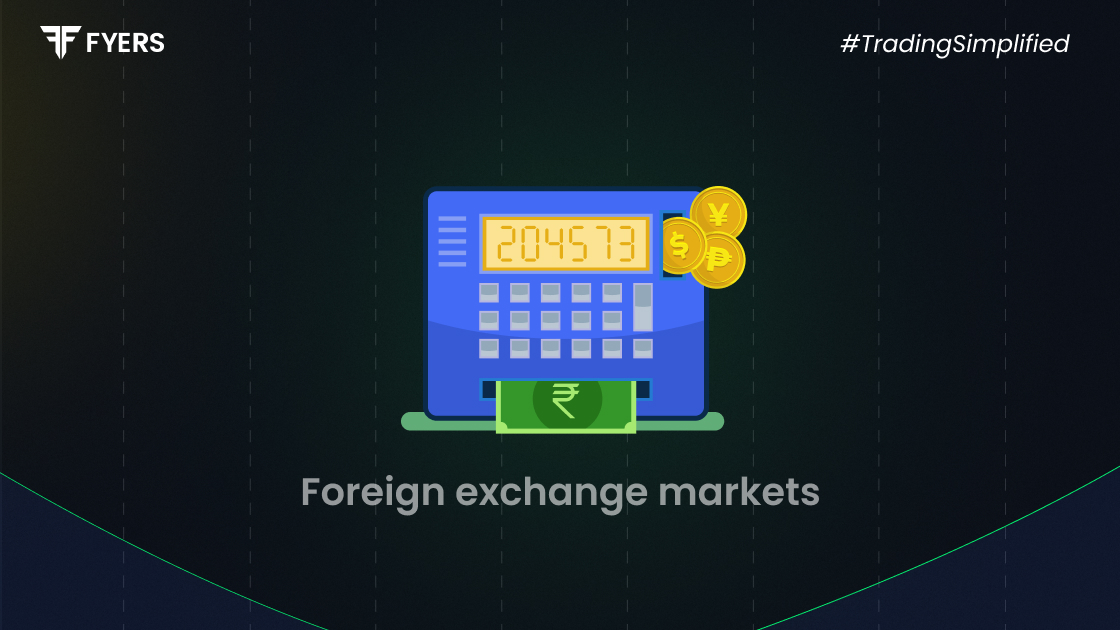

 31 Aug, 2025
31 Aug, 2025
 4 mins read
4 mins read

The foreign exchange market plays an important role in how countries trade and invest with each other. It is the place where currencies are exchanged. Every time someone travels abroad, buys imported goods, or invests in another country, the foreign exchange market is involved. This guide explains how the market works, why it matters, and who participates in it.
The foreign exchange market, also called the forex or FX market, is where currencies from around the world are bought and sold. It works without a central location, meaning it operates through computer networks and telephone systems. The market is open 24 hours a day, five days a week, across financial hubs like London, New York, Tokyo, and Sydney.
The exchange rate between two currencies changes based on demand and supply. These rates are affected by interest rates, government policies, political stability, and news about the economy. Unlike stock markets, there is no central exchange. All trading is done directly between buyers and sellers.
The foreign exchange market helps people and businesses in several ways:
Currency exchange: Lets you change one currency into another for travel, trade, or investment.
Hedging: Protects businesses and investors from losing money due to exchange rate changes.
Speculation: Allows traders to try and make profits from future currency price movements.
Capital transfer: Helps move money across borders.
Interest rate use: Lets investors benefit from differences in interest rates between countries.
The forex market has different types based on how and when currencies are exchanged:
Currencies are exchanged right away at the current rate.
Settlement usually happens within two working days.
Agreement to exchange currency at a set rate on a future date.
Useful for businesses that want to avoid currency risk.
Standard contracts to exchange currencies at a later date.
Traded on exchanges like the Chicago Mercantile Exchange (CME).
Buyer has the right, but not the duty, to exchange currency at a fixed rate before a certain date.
Often used to limit risk.
Two parties exchange currencies now and agree to reverse the transaction later.
Used mainly by banks to manage cash and interest rate risks.
Several groups take part in the forex market. They include:
Commercial Banks: Carry out most of the trading and help customers with exchanges.
Central Banks: Like the RBI, they manage the country’s currency and may trade to keep it stable.
Companies: Buy and sell foreign currencies to pay for goods and services.
Brokers: Act as a middleman to connect buyers and sellers.
Investment Funds and Hedge Funds: Trade large sums based on global economic trends.
Retail Traders: Individuals who trade small amounts using online apps and platforms.
The forex market is one of the biggest financial markets in the world. Here’s why it matters:
Makes international trade possible: Businesses can buy and sell goods across countries.
Encourages foreign investment: Investors can easily convert currencies to invest in different countries.
Keeps exchange rates fair: The large number of buyers and sellers ensures competitive pricing.
Supports central bank policies: Helps countries manage their economy and inflation.
Creates jobs: Many careers in finance, banking, and technology are linked to this market.
The main goals of the foreign exchange market include:
Easy currency exchange: For trade, travel, and business deals.
Protect against currency risk: Through tools like forward contracts and currency options.
Provide fair pricing: With many buyers and sellers, the prices are transparent.
Encourage investment: Helps money flow from one country to another.
Support economic policies: Governments use this market to manage inflation and growth.
Here are a few simple examples that show how the market works:
Buying imported goods: A company in India buys computers from Japan and pays in yen. It exchanges rupees for yen through the forex market.
Travel abroad: An Indian tourist going to the US needs dollars and exchanges rupees for dollars before travelling.
Hedging exports: An exporter in India expects to receive dollars after three months. To avoid loss if the dollar weakens, the exporter locks in a fixed exchange rate today.
Investing overseas: An Indian investor wants to buy shares in a UK-based company. They first convert rupees into pounds through the forex market.
Speculation: A trader expects the euro to become stronger and buys euros, hoping to sell later at a higher rate.
The foreign exchange market connects economies and enables global trade, travel, and investment. It is one of the most active markets in the world, with trillions of dollars exchanged daily. From businesses to central banks and individual traders, many people rely on this market to exchange currency and manage risk. Understanding how it works helps in making smarter financial decisions in a global economy.
It is a global market where people and companies buy and sell currencies. It allows easy exchange of money from one currency to another for travel, trade, or investment.
Participants include banks, central banks, companies, brokers, investors, and individual traders. Each group plays a role in keeping the market active and stable.
It affects how much the rupee is worth against other currencies. A strong or weak rupee can change the cost of imports, exports, travel, and foreign investment. The Reserve Bank of India also uses this market to support the economy.
Calculate your Net P&L after deducting all the charges like Tax, Brokerage, etc.
Find your required margin.
Calculate the average price you paid for a stock and determine your total cost.
Estimate your investment growth. Calculate potential returns on one-time investments.
Forecast your investment returns. Understand potential growth with regular contributions.